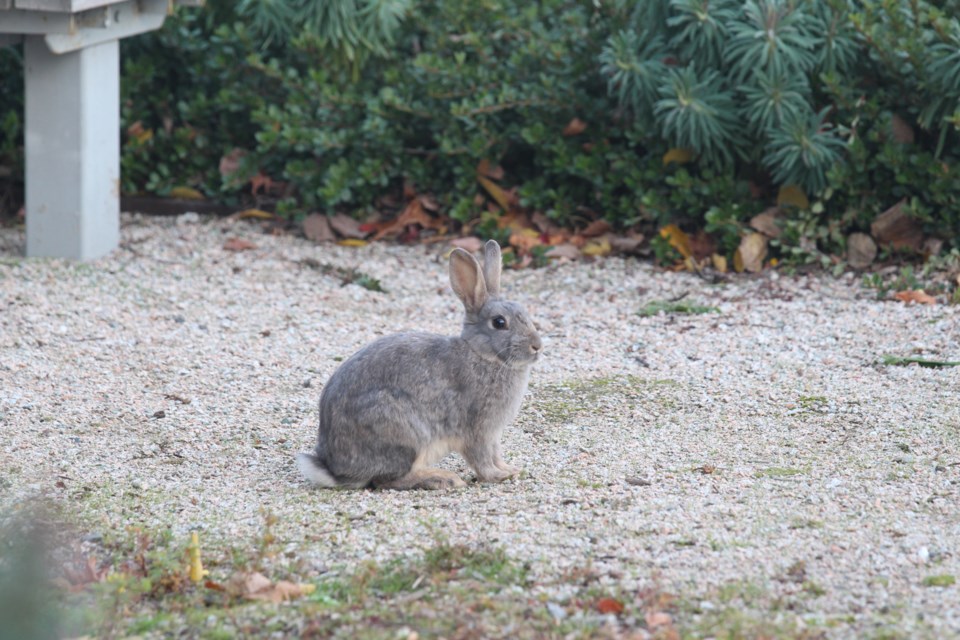A Richmond-based rabbit rescue organization is questioning the feasibility of Richmond’s latest feral rabbit management plan.
The plan, which was approved during Tuesday’s City Council meeting, calls for a bidding process where both for-profit and non-profit organizations can come forward with a plan to capture, sterilize and rehome rabbits that were found on “public land,” such as parks, schools and city right of ways.
The goal is for experts in rabbit welfare to provide a solution tailored to Richmond complete with financial breakdowns and practical considerations. City staff also hope to raise awareness through public education initiatives.
According to city staff, the plan is to send out a request for proposal (RFP) this summer, get responses by the end of September, and have a new direction by the end of the year.
Staff also clarified that organizations are welcome to collaborate on the potential solutions, but the city wouldn’t play “matchmaker” as Coun. Michael Wolfe suggested. The city will, however, either hold a site visit or an information session where all relevant organizations will attend and meet each other.
Despite the council’s approval, the plan has left some unanswered questions, according to one advocate.
Rabbitats founder Sorelle Saidman told the Richmond News that all organizations mentioned during the meeting, including Rabbitats and the Vancouver Rabbit Rescue and Advocacy (VRRA), are at capacity and are unable to expand on their current properties.
VRRA, which operates on 28th Ave. in Vancouver, is currently facing the risk of being shut down for contravening three bylaws, including having more animals than permitted on a residential property.
“So, it's very confusing who they're expecting to tender a proposal,” said Saidman.
“There's been media report after media report about the rescues being full, so it was like they were talking in a bubble when they didn't address that.”
Saidman added that the RFP is an “odious process” that requires an investment of time and resources the rescue currently lacks. The issue is also “too big” for any one organization.
More research needed
The new feral rabbit management plan was based on recommendations from the Feral Rabbit Management Study conducted by city staff and the Invasive Species Council of British Columbia last year.
The study observed 39 and 72 feral rabbits in 24 city-owned locations in July and August 2022 respectively and concluded the rabbits were “widespread throughout the community” and there was a “high rate of reproduction.” It also noted adverse impacts such as infestations in community gardens.
Staff told council on Tuesday that Rabbitats was asked to provide a review of the study but failed to do so.
However, Saidman said it was not true.
“We were not consulted for the report,” she said.
She also expressed disappointment that certain policy changes were not included in the plan.
Although the study recommended creating new or amending existing bylaws to reduce the likelihood of domestic rabbits being abandoned in city parks, this was dismissed by reason that Richmond already has “the appropriate bylaws in place.”
Richmond’s current bylaws prohibit the feeding and dumping of feral rabbits or any animals in public parks or school grounds. Homeowners are limited to two domestic rabbits per household, and pet stores are banned from selling rabbits. Any rabbits brought into shelters are also sterilized before they get adopted.
When Coun. Wolfe and Coun. Carol Day asked staff about the possibility of imposing bylaws to ban the sale of rabbits on social media and other platforms, and prohibit ownership of unsterilized rabbits, staff told council that was not feasible.
“We also strongly feel a new bylaw is needed, something we're hoping for province-wide. It's unfortunate there isn't support for that in our own city,” said Saidman.
Saidman added that it is unlikely that Rabbitats will participate in the RFP process since its current priority is to stop feral rabbit populations from growing in other municipalities and “prevent those areas from becoming a Richmond.”
Potential problem areas that Rabbitats is focusing on include YVR, Granville Island and other areas around the City of Vancouver.
“(The City of Richmond has) put us in a chicken-or-the-egg situation. We can't put in a proposal without the resources. We can't get resources without a successful proposal.”



